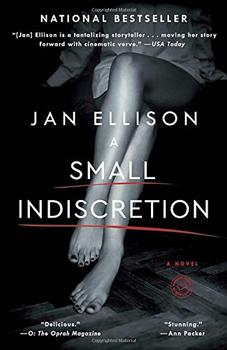Book Club Discussion Questions
In a book club? Subscribe to our Book Club Newsletter!
Please be aware that this discussion guide will contain spoilers!
- In the beginning of the novel, Annie writes: "Between those bookends was a family whose happiness might still be intact if only I'd been able to see the threats to it more clearly." Is Annie reponsible for Robbie's accident, and for her family's unraveling? Is it in her power to protect them?
- There is more than one indiscretion in the novel. Which do you think the title refers to, or might it refer to more than one?
- On page 302, Annie writes that it is "easier to blame the impulsiveness of youth than the wanton self-indulgence of a grown woman." How can this statement be assessed in the context of Annie's story? Why does Annie confess to Jonathan upon her return from London?
- After Jonathan moves out, Clara and Polly are passed between their parents "like a restaurant dessert." Is Jonathan's decision to move out defensible? How are the girls' childhoods altered by the events of the summer? How might they look back on this period in their lives?
- The novel takes the form of a confessional letter from Annie to Robbie. It also moves back and forth across two decades and spans three continents. How did this structure affect your reading experience? Does the structure remind you of any other novels?
- Annie's youthful relationship with Patrick is tortured and unfulfilling, yet she continues to yearn for him for more than twenty years. What causes this obsession? And why does it fade once Annie finally meets Patrick in London as an adult?
- On page 250, Patrick defines art as "whatever stands in the world with no other purpose than to move us." Annie in turn suggests that art should at least be beautiful. Do you agree with either of these definitions? What other scenes and situations in the novel speak to the themes of art and beauty?
- Early in the novel, Annie writes: "The heart is large, and there is more than one material in the bucket we call love." How does the novel address the theme of the nature of love? How do notions or definitions of love evolve as the novel progresses, and Annie matures?
- Alcoholism runs in Annie's family, yet when she finds herself abroad at nineteen, she begins to drink heavily. How might Annie's upbringing have influenced this behavior? What leads to Annie's "bargain" with herself in the clinic in San Francisco, as described on page 209?
- The letter Annie receives from Emme's uncle contains a major revelation. Did this revelation come as a surprise? What previous scenes hint at this revelation? Is Emme justified in holding Annie responsible for the shaping of her own history?
- Annie posits that a memory is "by its nature a revision…. shaped by the waves of time, and by the history that has rushed against it since…" How does the novel interrogate the nature of memory? Is Annie a reliable narrator? How would the story be different if it were told from Jonathan's point of view? Or Robbie's? Or Emme's?
- On page 273, Annie realizes that if she expects to be forgiven, she must "forgive indiscriminately" from now on. Which characters, besides Annie, seek forgiveness? Which characters are ultimately redeemed, and which, if any, are not?
- The novel concludes without describing what happens when Annie flies to Paris to reveal to Robbie the truth about his paternity and about Emme's motivations. How do you imagine events unfolding between Annie and Robbie, and ultimately, between Robbie and Emme?
Unless otherwise stated, this discussion guide is reprinted with the permission of Random House.
Any page references refer to a USA edition of the book, usually the trade paperback version, and may vary in other editions.




